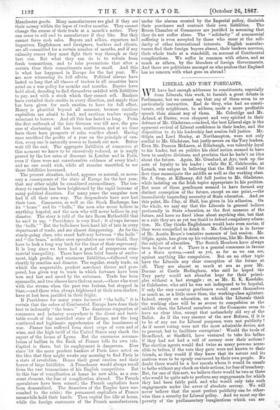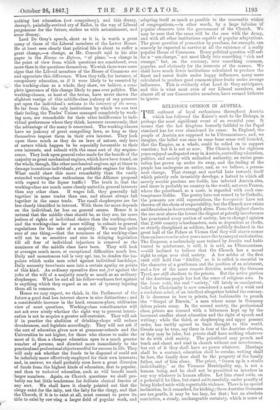LIBERAL AND TORY FORECASTS.
WE have had enough addresses to constituents, especially from Liberals, this week, to furnish a great debate in Parliament, but we cannot say that any of them seem to us
particularly instructive. Earl de Grey, who had no consti- tuents, only neighbours, to address, made a more profitable speech than almost any of them. Mr. Coleridge and Mr. Acland, at Exeter, were eloquent and very spirited in their defence of Mr. Gladstone,—indeed, the best Liberal sign is the apparent revival of Liberal confidence in their leader, and the disposition to do his leadership last session fall justice. Mr.
Gilpin and Lord Henley, at Northampton, were not only cordial to Mr. Gladstone, but justly severe on the Tory leaders. Even Mr. Duncan McLaren, at Edinburgh, was tolerably loyal to his leader, but on politics his chief notion seemed to have been to analyze divisions, and proclaim that he hadn't an idea about the future. Again, Mr. Craufard, at Ayr, took up the note of loyalty to his leader ; while Sir E. Celebrooke, at Lanark, was unique in believing that the Bill would for the first time emancipate the middle as well as the working class. Sir J. Gray, at Kilkenny, did full justice to Mr. Gladstone. while insisting on the Irish topics appropriate to his position. But none of these gentlemen seemed to have formed any distinct conception of the future, except on one point,—the immediately impending necessity of State education. And on this point, Mr. Clay, of Hull, has given in his adhesion, On the whole, we may say that the Liberals in general believe profoundly in State education, as the first measure of the future, and have no fixed ideas about anything else, but that as a rule they are as yet too timid to defend compulsory educa- tion. Mr. Clay thinks Englishmen would hate even nectar, if they were compelled to drink it. Mr. Coleridge is in favour of Mr. Austin Brace's tentative measure of last session. Mr. Gilpin, again, has given up his voluntaryism, like Mr. Baines, on the subject of education. The Scotch Members have always been in favour of it. There is a general consensus in favour of a State system,—and as yet, as far as we can see, against anything like compulsion. But on no other topic have the Liberals any clear conception of the future at all. They are almost as much at sea as poor Mr. Ducane at Castle Hedingham, who said he loped the Tory party would not abandon hope for their princi- ples without a last struggle ; or, as Mr. E. K. Karslake. at Colchester, who said he was not indisposed to be hopeful, if only the easy country gentlemen would exert themselves as much as, or a little more than, the working-class agitators. Indeed, except on education, on which the Liberals think the working class will be as averse to compulsion as the middle class, the Liberal members of the Commons seem to have no clear idea, except that melancholy old cry of the Ballot. As if the very essence of the new Reform, if it is to be of any use for Liberal purposes, were not publicity I As if secret voting were not the most admirable device, not to prevent, but to facilitate corruption ! Would the tools of Broadhead, at Sheffield, have ventured to take his bribes if they had not had a veil of secrecy over their actions ? The election agents would find twice as many persons acces- sible to bribes, if the vote they gave were not known to their friends, as they would if they knew that its nature and its motives were to be openly canvassed by their own people. No doubt there would be a few rascals whom it would be unsafe to bribe without any check on their actions, for fear of treachery. But, for one of this sort, we believe there would be two or three who would be quite safe to perform any engagements for which they had been fairly paid, and who would only take such engagements under the cover of absolute seeresy. We will never believe that the most perfect publicity can be other- wise than a security for' Liberal policy. And we must say the poverty of the parliamentary imaginations :which can see
decrepit, painfully-revived cry of Ballot, in the way of Liberal programme for the future, strikes us with astonishment, and some dismay.
Lord De Grey's speech, short as it is, is worth a great many of those of the Liberal members of the Lower House. He at least sees clearly that political life is about to suffer a great change,—a change, as Mr. Cracroft said in his able paper in the Essays on Reform, "of plane,"—a change in the point of view from which questions are considered, even more than in the questions themselves. We wish there were more signs that the Liberal members of the House of Commons see and appreciate this difference. When they talk, for instance, of compulsory education, as if it were likely to be resented by the working-class as a whole, they show, we believe, a com- plete ignorance of this change likely to pass over politics. The working-classes, at least of the towns, have never shown the slightest vestige of this middle-class jealousy of any pressure put upon the individual's actions in the interests of the many. So far from this, the only institutions by which we can test their feeling, the Trades' Unions managed completely by work- ing men, are remarkable for their utter indifference to indi- vidual preferences where they think, however erroneously, that the advantage of the many is concerned. The working-classes have no jealousy of great compelling laws, so long as they themselves impose them in their own interest. They look upon them much as they do on laws of nature, only laws of nature which happen to be especially favourable to their own interests, and submit with the same sort of dry acquies- cence. They look upon general rules made for the benefit of the majority as great mechanical engines, which have been found, on the whole, though, like other mechanical engines, apt at times to damage incautious individuals, yet profitable engines for them. What could show this more remarkably than the vastly extended working-class enthusiasm for the Alliance proposal with regard to the liquor traffic ? The truth is, that the working-class are much more closely united in general interests than any other class. If wages fall, they generally fall together in more trades than one, and almost always fall together in the same trade. The small shopkeepers are far less closely identified in interest. With them far more depends on the individual, far less on general causes. Hence it is natural that the middle class should be, as they are, far more jealous of rights of individual choice than the working-class, and the working-class far more willing to submit to general regulations for the sake of a majority. We may feel quite sure of one thing,—that the nominees of the working-class will not be so sensitive and nice in delaying legislation till all fear of individual injustices is removed as the nominees of the middle class have been. They will look at averages much more, at exceptional difficulties much less. Daily and monotonous toil is very apt, too, to deaden the im- pulses which make men rebel against individual hardships. Daily necessity browbeats men into a certain apathy on points of this kind. An ordinary operative does not _fret against the yoke of the will of a majority nearly as much as an ordinary shopkeeper. What he and all his fellow-workmen fret against is anything which they regard as an act of tyranny injuring them all in common.
Hence we may expect, we think, in the Parliament of the future a good deal less interest shown in nice distinctions ; and
a considerable increase in the hard, common-place, utilitarian view of most questions. Working-class constituencies will not ask over nicely whether the right way to prevent intoxi- cation is not to acquire a greater sell-restraint. They will ask if in practice the abolition of drinking-shops will reduce drunkenness, and legislate accordingly. They will not ask if the sort of education given now at grammar-schools and the Universities be not higher, for those who choose to make the most of it, than a cheaper education open to a much greater number of persons, and directed more immediately to the practicaland professional objects needful for success in life. They will only ask whether the funds to.be disposed of could not be infinitely more effectively employed for their own interests; and, in answer, we shall probably soon have a great diversion of funds from the highest kinds of education, first to popular,
and then to technical education, such as will benefit much larger numbers. Again, on Church questions we shall pro-
bably see but little tenderness for delicate clerical fancies of any sort. We shall have it clearly pointed out that the clergy exist for the laity, not the laity for the clergy, and that the Church, if it is to exist at all, must consent to prove its title to exist by coy ring a larger field of popular work, and
nothing but education (not compulsory), and this dreary, adapting itself as much as possible to the reasonable wishes of congregations,—in other words, by a large infusion of popular elements into the government of the Church. We may be sure that the same will be the case with: the Army, and with all other institutions capable of popular adaptations. The great question of promotion by purchase, for example, can scarcely be expected to survive at all the existence of a really popular House of Commons. Every political question will suf- fer a "sea-change," not most likely into something "rich and strange," but, on the contrary, into something common, popular, and obviously for the interests of the masses. We shall have much fewer institutions calculated to produce the finest and rarest fruits under happy influences, many more calculated to produce good common-place fruits under average influences. This is evidently what Lord do Grey anticipates, and this is what most even of our Liberal members, and almost all of our Conservative members, have seemed hitherto to ignore.



































 Previous page
Previous page